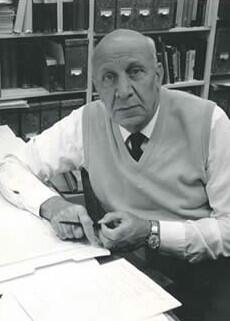Abdelhamid Sabra first to teach history of Arabic science
Area studies to Islamic studies 1972
Abdelhamid Sabra First to Teach History of Arabic Science
Abdelhamid Sabra was born in Tanta, Egypt in 1924 and studied philosophy at the nascent Alexandria University. In 1950, the Egyptian government sent him to the London School of Economics where he earned a doctorate in the Philosophy of Science under Karl Popper and wrote a dissertation on the “Theories of Light from Descartes to Newton.” Sabra then taught at Alexandria University and the Warburg Institute in London. In 1972, he accepted an offer to join the History of Science Department at Harvard, where he remained until his retirement in 1996 and taught courses such as “Arabic Scientific Texts,” “Islam and Scientific Thought,” and “The Reception of Greek Thought in Islam.” Professor Sabra is best known for his contributions to the study of medieval Arabic science, especially The Optics of Ibn al-Haytham (1989), a critical edition, English translation, and commentary of Kitāb al-Manāẓir. In 2005 he was awarded the George Sarton Medal for lifetime achievement by the History of Science Society and a prize by the Kuwait Science Foundation.
Transcript
Prof. William Graham | Abdelhamid Sabra's expertise in history of science and kalam
William Graham
Sabra, for instance, I never studied with, but a wonderful colleague and a lovely man, who just did fascinating work, particularly his work on a 12th or 13th-century treatise on vision. He was very widely read and articulate in, for instance, in kalam, more generally. And I remember a conference which was held here, it was an interesting conference. They had a conference in honor of Harry Wolfson, who, as you know, wrote a book about kalam, even though he was not an Islamicist or an Arabist, but wrote a book about kalam from his standpoint of being very well versed in both Jewish and Christian thought, I guess either in 70 or 71. I don't remember which, but it was in that year 70-71. And [we] sat in on this conference as graduate students, basically, or young scholars, in any case. Certainly it was before I was teaching, and before I did my dissertation. And it was fascinating to see this group of Mahdi, Sabra, Frank, and van Ess in particular, there were others there, but to see the four of them, discuss kalam, and the whole sort of agenda for kalam studies and so on. That's something that stands out for me even today, even though I have never worked much in kalam, I did a field of kalam with Mahdi. But it was a fascinating conference just because of this group of minds that came together. And they held this thing in honor of Harry Wolfson. And Wolfson was there. And so to hear these people talking was a real privilege. And as I say, someone like Sabra, who worked in history of science, also had a wide range of talent within Islamic studies more generally, in the Arab world, and he knew, of course, he was Egyptian and knew Egypt exceeded exceedingly well. So he was a great resource for people for, you know, two or three decades while he was here. I mention that because I respected Sabra so much. He was a man of a very gentle temperament and wonderfully supportive. If you wrote or did anything, he seemed to read it and then shoot you a note or call you up and say he thought this was great or that was great. So he was omnivorous in that regard. So Sabra is someone whom I think of really with great warmth. He and his wife were wonderful parts of the wider community here in Near Eastern Languages and also in History of Science.

